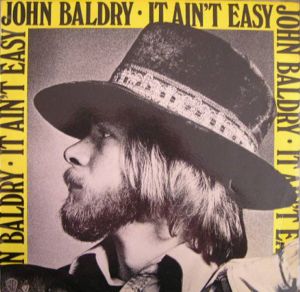
- Format: MP3

It Ain't Easy features a British blues/rock line-up befitting the man behind the Long John Baldry moniker. This album returns Baldry to a decidedly edgier and hipper audience, with a literal cast of all-stars on some of the more adventurous material he had covered to date. This is no doubt due, at least in part, to the involvement of rock superstars Rod Stewart and Elton John. In fact, John confesses to have taken the last name in his stage moniker from Baldry's first. Among their contributions to the project, Stewart and Elton divided the production tasks — each taking a side of the original album. Immediately, Baldry sheds the MOR blue-eyed pop soul image. The backing band on Stewart's side include fellow Face and future Rolling Stone, Ron Wood, on electric guitar and acoustic guitarist Sam Mitchell, who appeared on many of Stewart's early '70s solo albums. His contributions to this side are numerous, including an especially potent solo on Leadbelly's "Black Girl." This authentic duet featuring Maggie Bell on co-lead vocals is a definite return to the Mississippi Delta for the song which is also known as the bluegrass standard "In the Pines." Other highlights from Stewart's sector include the humorous and self-biographical lead-off track "Conditional Discharge," which is paired with the full-tilt boogie of "Don't Try to Lay No Boogie-Woogie on the King of Rock and Roll." Arguably the oddest cover version on this album is also among the best; "Morning Morning" from head Fug Tuli Kupferberg is given new and surprisingly fresh life by Baldry. Highlights from Elton John's side include Randy Newman's "Let's Burn Down the Cornfield," which would have fit perfectly on John's Tumbleweed Connection album. Additionally, "Rock Me When He's Gone" was actually recorded by John, although his version remained unissued until the 1992 odds and sods compilation Rare Masters.